

Sea Shepherd Cries Foul Over Western Australia Shark Cull. October 1, 2012 It’s Time for the Fear-Mongering to End by Julie Andersen, Director, Shark Campaigns Tiger Shark caught in shark net Photo: Mark AddisonIn response to current reports that officials in Western Australia are to begin waging war on sharks by initiating a cull of any sharks swimming near beaches in the region, Sea Shepherd Conservation Society is crying foul.
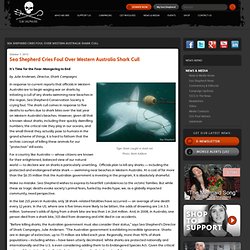
The shark cull comes in response to five deaths to surfers due to shark bites over the last year on Western Australia’s beaches. However, given all that is known about sharks, including their quickly dwindling numbers, the critical role they play in our oceans, and the small threat they actually pose to humans in the grand scheme of things, it is hard to fathom that the archaic concept of killing these animals for our “protection” still exists. For a country like Australia — whose citizens are known for their enlightened, balanced view of our natural world — to declare war on sharks is particularly unsettling. North Sea cod: Is it true there are only 100 left? 29 September 2012Last updated at 19:16 ET By Hannah Barnes & Richard Knight BBC News If recent reports are to be believed, the North Sea cod's days are numbered.
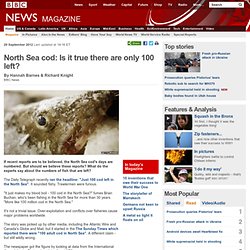
But should we believe these reports? Global warming 'may lead to smaller fish' - Climate Change - Environment. Warmer oceans will carry less dissolved oxygen, causing fish to grow to smaller sizes and forcing them to move to cooler waters, the research published in the journal Nature Climate Change claims.

Scientists predict that a rise in global temperatures over the coming decades will cause the average body size of sea fish to decline by between 14 and 24 per cent. The predication is based on a study of more than 600 species of saltwater fish, including the Atlantic cod and the North Sea haddock. OCEARCH Global Tracking Central. Shark fin debate in Hong Kong - Shark Year Magazine. Endangered Species of the Week: Atlantic halibut. Atlantic halibut (Hippoglossus hippoglossus) Species: Atlantic halibut (Hippoglossus hippoglossus) Status: Endangered (EN)
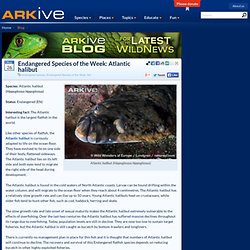
Floating robot helps track great white sharks. Some At-Risk Shark Species Are Ending Up In U.S. Soups. By April Fulton | NPRFriday, August 10, 2012 Sharks are some of the most feared and fascinating animals on the planet.
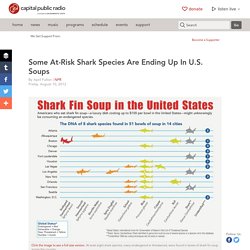
They've had their own week of awareness-raising and celebration on the Discovery Channel for the last 25 years. But some say they are also delicious — as in the Chinese delicacy — shark fin soup. As we've reported before, shark finning to meet demand for the soup is a booming business: An estimated 73 million sharks are killed each year. In the U.S., several states have taken steps to block sales of the crunchy, salty soup, which can sell for up to $100 a bowl. But just what kind of shark fins are ending up in the soup in the U.S.? It's pretty impressive that the scientists were able to find any usable DNA at all in a highly processed food product like soup. The researchers had to devise their own DNA sleuthing methods; Chapman hopes law enforcement officials will adopt these techniques in states with restrictions on the sale, trade and possession of shark fins.
Sharks tagged off Scotland monitored online. Venezuela Ends Shark Finning, Creates Protected Area. Washington Pew applauds action to ban shark fishing in critical breeding habitat Resources:Press photos Venezuela set forth a series of measures this week to protect sharks within its waters.

Most significantly, commercial shark fishing is now prohibited throughout the 3,730 square kilometers (1,440 square miles) of the Caribbean Sea that make up the popular Los Roques and Las Aves archipelagos, whose pristine beaches and coral reefs make it a diving and fishing attraction. Scientists have identified Los Roques, located about 128 kilometers (80 miles) off the Venezuelan coast, as an important breeding ground and nursery for populations of several species of sharks, including the lemon shark and the Caribbean reef shark.
Bowmouth guitarfish videos, photos and facts - Rhina ancylostoma. Pocket : The Surprisingly Mysterious Eels. One quarter of grouper species being fished to extinction. The orange-spotted grouper, Epinephelus coioides, from the Indo-Pacific is categorized as Near Threatened (photo: Luiz Rocha): An international team of scientists has made a global assessment of threats and extinction risks in the multi-billion dollar grouper industry May 2012.
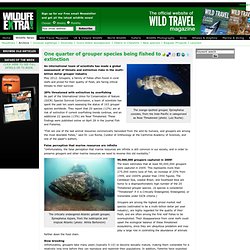
Groupers, a family of fishes often found in coral reefs and prized for their quality of flesh, are facing critical threats to their survival. 20% threatened with extinction by overfishingAs part of the International Union for Conservation of Nature (IUCN) Species Survival Commission, a team of scientists has spent the past ten years assessing the status of 163 grouper species worldwide. They report that 20 species (12%) are at risk of extinction if current overfishing trends continue, and an additional 22 species (13%) are Near Threatened. "Fish are one of the last animal resources commercially harvested from the wild by humans, and groupers are among the most desirable fishes," said Dr.